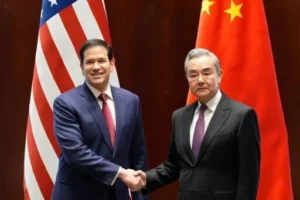
Management education relies a lot on the analysis of case studies and to memorize an array of economic theories. Equipped with this knowledge, managers aspire to outperform their peers to be selected for promotion. Yet, the truth is, task performance holds no information on leadership skills and management theory is, with few exceptions, building on a certain and stable economic environment. Only very few organizations are training to deal with uncertainty and distress. This is reserved for first responders and elite military units, dealing with ultimate high stakes and no alternative but success. To utilize the lessons learned from the military for the business environment, a closer look pays off.
Airborne operations behind enemy lines are challenging. Only highly trained volunteers make the cut in a rigorous selection process and can pride themselves, to wear the insignia of the elite forces.
From an outside perspective, this holds little incentive. The service is rewarded with cruel physical training, sacrifice for the family, beyond measurement, and financial compensation, below mentioning. Still young men and women are choosing to devote themselves to a cruel-some daily routine, in essence qualifying them to be appointed for life threatening missions, to serve their country.
Whilst companies incentivise employees through financial benefits, military organisations create a strong sense of belonging and a sense of purpose.
The secret to building a victorious unit is its “esprit de corps”. The uncompromising camaraderie that bonds soldiers on the battlefield is what veterans of elite fighting units miss the most once they have left their units. The equivalent in the business world would be a strong and consistent corporate culture aligning the organization throughout all levels with the vision and true purpose of its existence. In the forces, this bridges personal animosity, individual ambitions, and other levels of difference poised to cause interpersonal friction in an economic environment.
Deconstructing the difference between a random group of young men and an elite fighting force, we must be aware of how paratroopers operate. The work begins with jumping out of a low-flying airplane. Yet, the brave jump is only a small aspect of the reality of airborne operations. Covering long distances on foot, carrying heavy backpacks, little to no sleep, lack of supplies, and no possibility for relief while operating on enemy territory are inherent elements of airborne operations.
This comes with increasing degrees of exhaustion and an exponential increase in all issues one may remember from the last hiking weekend, such as painful blisters, itching insect bites, bruises from the rucksack, discomfort from wet clothing, sleep deprivation, reduced personal hygiene, or even injuries like a twisted ankle with no option to return to base or even take a break. These are all part of the Airborne reality. In terms of business language, soldiers are exposed to resource constraints, increasing task performance overload, escalating stress levels, and a high degree of external uncertainty.
“What got you here, won’t bring you there” (Marshall Goldsmith)

The striking difference between military leadership training and executive education is the basic assumption about the reliability of plans. In the business world, we are used to dealing with ordered disorder. This refers to the Cynefin framework, where we are exposed to ordered challenges. Solutions are based on sound analysis, categorization, and approved responding tools. Business leaders can rely on earlier experiences – either collected during their own career path or by studying similar challenges of other companies. This is why case studies take up a significant part of the curriculum of business schools. Learning from other people’s mistakes makes their own lives a lot easier. Yet, research also shows that the focus on a specific set of skills creates blind spots in other areas. Executives are on the lookout for specific, expected, and familiar problems and events, yet can ignore other signals.The Cynefin framework
“Everyone has a plan, until he gets punched in the mouth.” (Mike Tyson)
The military considers unordered disorder as the norm. The training of military leaders focuses on the chaos of battle, where immediate action is needed without the luxury of sound analysis and testing. Mastering chaotic disruption requires swift action, continuous assessment of progress, and permanent response and adjustment.
Although decisions are bound to the chain of command, in elite forces, collective assessment of information is trained. Observations from even the lowest ranks are collected, trusted, and included in decisions. A disconnect between leadership and soldiers on the ground is considered a major failure. Procedures are in place to overstep the chain of command if dysfunctional orders are recognized. The chain of command distributes authority unambiguously, while officers are fully accountable for their orders. The military organization is entirely focused on problem-solving. The concentration on achieving mission goals cuts relationship conflicts within the organization.
Not acknowledging the severity of the situation leads to dysfunctional behaviour.
Today’s economic environment is disrupted by unprecedented events, including pandemics, wars, and economic turmoil. This exceeds the degrees of ordered disorder and exposes executives to complex challenges.
If things go wrong, executive behavior can increase the severity of the situation. This includes patterns of:
- Secrecy and denial
- Blame and scorn
- Avoidance and turf protection
- Passivity and helplessness
For other stakeholders, this can be surprising as senior executives are generally considered well-meaning, capable, and equipped with access to data and sufficient resources.

A slow poison from the inside
Research has revealed that high levels of stress and uncertainty can exhaust the stress resilience of executives, leading to a deterioration in their focus and ability to apply sound judgment. Many of the primary sources of stress challenging executives within organizations are caused by the organization itself. These include:
- Rapid and drastic changes in the work environment, such as increased workload, changes in processes, styles, and communication
- Financial and legal concerns caused by fear of job loss, ongoing relationship conflicts, etc.
- Emotional disruption caused by continuous and repeatedly non-appreciative communication, high pressure from senior management, etc.
- Future worries, such as reputational consequences and the continuation of one’s own career path.
To retain sound decision-making abilities in times of turmoil, organizations benefit from strategies that limit the stress exposure of their executives. This falls on the senior management of the firm to create an adequate environment.

Loyalty runs both ways.
For leaders to thrive, the military is creating a safe environment. Job loss or financial consequences are no threat for soldiers. Part of the compensation for the service is economic and social stability.
In essence: A soldier, acting the best of his abilities, will be heard regardless of the rank, challenges are mastered together, economic threats do not exist.
Formalized tradition establishes sound rapport for the values of the organization, creating a strong sense of belonging. The soldiers are bonding throughout the enduring training, accepting the challenge and significant discomfort for little monetary compensation for the sake of serving a higher cause. Heroism is not self-serving, but a byproduct of the social contract the operating teams have among themselves, including accountability among each other and safety and protection within the context of the unit.
The military culture has been developed in the face of immediate danger. Applicable lessons learned for corporations include:
- Different degrees of disorder exist, requiring different skill sets to master. Organizations must be aware of the level of disorder they are facing and be able to adjust their response by appointing the right executives.
- Being excellent in one dimension creates weaknesses in others. Diversity at the leadership level avoids blind spots.
- When solving critical challenges, there is no room for politics. Focus must be exclusively on problem-solving. This requires trust and recognition among all team members.
- Authority must be paired with accountability.
- To perform at the peak of their abilities, employees need a sense of belonging and feeling safe. This is built on a consistent corporate culture but also on deliberately managing stress levels throughout the organization, specifically in critical situations.
Want to hear more on this topic from the speaker Kolja A Rafferty? Join Kolja Rafferty this Tuesday (Apr 25) in Dubai for the event by “The Social”, where not only you will have an opportunity to speak with the speaker, but also to connect to other likeminded people based on that topic.
The Social

QR Code To Sign Up
The Social” is the first global high-quality networking community dedicated to curated networking for intellectuals. Once a member, all you have to do is sit back and enjoy our ambassadors taking you on a networking spree through a series of periodic events, organized especially to give you a continuous opportunity to meet new and useful people in your life, both locally and globally. Founded in 2013 in Switzerland, “The Social” has quickly grown its presence to 50+ cities in 15 different countries across all continents. Switzerland remains the heart of the international organization, which coordinates a team of volunteer ambassadors developing their respective local communities, while Dubai is locally represented by a team of competent Ambassadors. Sign up for the next event on April 25.
About Author
Kolja A. Rafferty, MBA, CTP, IDP-C
Kolja is an international executive, certified Non-Executive Director and turnaround specialist. He is passionate about addressing complex and critical challenges in corporate transformation and helping companies to reach the next level. As managing partner of Leverage Experts (Middle East) LLC, he is heading the operations of the prestigious Swiss boutique consultancy in the United Arab Emirates.
In addition to his consulting and executive duties, Kolja serves as an executive coach, keynote speaker and author on corporate transformation.
Before his career in the finance industry, Kolja served as commissioned officer in a paratroopers battalion.
Kolja.rafferty@leverage-experts.com
https://www.linkedin.com/in/koljarafferty/






